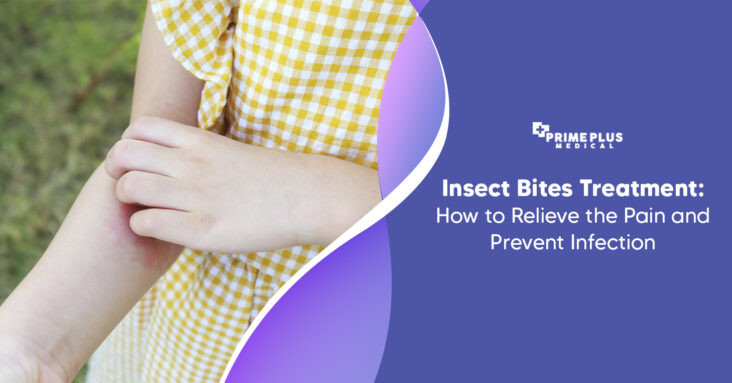There are many ways to insect bite treatment that you can do yourself at home. One for insect bite treatment is washing the bitten area with water or soap. And another way of insect bite treatment is compressing with ice cubes the area bitten by insects.
Insects are an unavoidable part of our lives, especially during the warmer months. Unfortunately, they can also leave us with uncomfortable and itchy bites that can put a damper on outdoor activities. In this article, we’ll discuss different types of insect bites, their symptoms, and effective treatments to soothe the itch and promote healing.
Types of Insect Bite
There are various types of insect bites, but the most common ones are mosquito bites, bee stings, wasp stings, and ant bites. Mosquito bites are often small, red bumps that itch and can be found in clusters. Bee and wasp stings are painful and can cause swelling and redness in the affected area. Ant bites are typically small and red, but they can be painful and itchy.
Symptoms of Insect Bite
The symptoms of insect bites vary depending on the type of insect and the individual’s reaction to the bite. Mosquito bites typically cause itching, redness, and swelling. Bee and wasp stings can cause pain, swelling, redness, and itching. In some cases, people may experience an allergic reaction to bee and wasp stings, which can cause severe symptoms such as difficulty breathing and swelling of the face, mouth, and throat. Ant bites may cause itching, redness, and a painful bump.
Causes of Insect Bite
Insects are one type of animal known to bite humans often. Some will only sting when they feel threatened, such as centipedes or centipedes, while others deliberately bite to feed on human blood. Bites from both types of insects can cause mild to severe conditions.
Risk Factors for Insect Bite
Anyone can get an insect bite or sting. However, several factors can increase a person’s risk of being bitten or stung by this animal, namely:
- Lives near wet fields or yards.
- Working or living with animals.
- Spend a lot of time outdoors.
- Live in a hot climate.
- Do not give flea medication to pets.
- Keep insects, such as bees or wasps, as a hobby.
Insect Bite Treatment
If you’ve been bitten or stung by an insect, there are several things you can do to ease the discomfort and promote healing. Here are some effective treatments for insect bites:
- Wash the affected area with soap and water – this will help to remove any dirt or bacteria that may have entered the wound.
- Apply a cold compress – a cold compress can help to reduce swelling and alleviate pain.
- Take an antihistamine – if you’re experiencing severe itching or swelling, an antihistamine can help to reduce these symptoms.
- Apply a topical cream – topical creams containing hydrocortisone or calamine can help to soothe itching and reduce inflammation.
- Elevate the affected area – if the bite or sting is on a limb, elevating the affected area can help to reduce swelling.
- Take pain relievers – if you’re experiencing pain, over-the-counter pain relievers such as ibuprofen or acetaminophen can help to alleviate the discomfort.
read more Beware of Ear Infection Symptoms in Your Child!
Prevention of Insect Bite
Preventing insect bite is always the best course of action. Here are some effective prevention strategies:
- Wear protective clothing – when spending time outdoors, wear long-sleeved shirts, pants, and hats to protect your skin from insect bites.
- Use insect repellent – apply insect repellent to exposed skin to deter insects from biting.
- Avoid sweet-smelling perfumes and lotions – insects are attracted to sweet smells, so avoid using heavily scented perfumes and lotions when spending time outdoors.
- Keep your surroundings clean – eliminate standing water and keep outdoor areas clean and free of debris to reduce the presence of insects.
read more Type 2 Diabetes in Children: Things All Parents Must Know
When to See a Doctor
Immediately consult a doctor if you experience symptoms that do not improve or even worsen after being bitten or stung by an insect. You also need to see a doctor if you share some of the following conditions:
- Bitten or stung in the mouth, throat, or near the eyes.
- Bites or stings that cause swelling and redness of the skin.
- There are signs of infection in the wound, such as pus, worsening pain, swelling, and skin redness.
- The infection is increasingly widespread and can be marked by increased body temperature, swollen lymph nodes, and other symptoms similar to flu symptoms.
Immediately go to the emergency room or call an ambulance if someone around you has an anaphylactic reaction, as mentioned above. This condition requires prompt treatment because it can be life-threatening.
Diagnosis of Insect Bites
To diagnose insect bite, the doctor will first ask the patient about the symptoms experienced and the type of insect that bit. After that, the doctor will examine the skin bitten by the insect and the surrounding area.
If the type of insect that bit the patient can spread the disease, the doctor will do a blood test to detect the disease carried by the insect.
If you’re experiencing persistent symptoms after being bitten by an insect, don’t hesitate to visit Prime Plus Medical for a checkup. Our team is here to provide you with top-notch treatment options to help you recover quickly. We understand the discomfort and potential danger that can come with insect bites, and we’re dedicated to helping you find relief. From our state-of-the-art facilities to our experienced medical professionals, you can trust us to provide you with the care you deserve. So why wait? Take control of your health and schedule a visit to Prime Plus Medical today.

